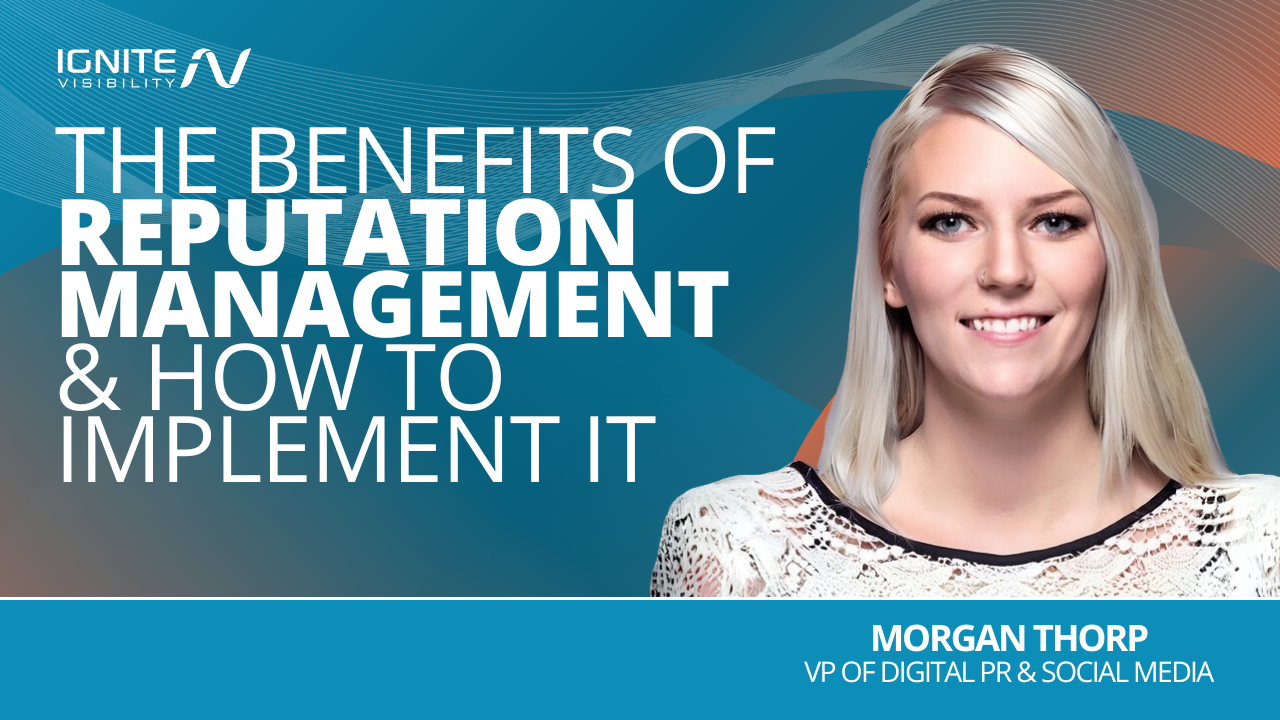
How important is your business’ online reputation?
71% of people read online reviews before making a purchase. Most people trust customer reviews as much as personal recommendations from friends and family.
In fact, 60% of consumers think the number of reviews for the business is essential when deciding which local businesses to patronize. And if your reviews aren’t recent, 73% of consumers will see that as an issue.
These statistics show how crucial your brand’s online image is. To remain competitive, you need to make an intentional effort to optimize your online presence.
With an effective reputation management program, you can keep your brand in good standing among your audiences and your industry peers. In this blog VP of Digital PR & Social Media, Morgan Thorp, explores how online reputation management services go beyond review sites, requiring businesses to monitor social media mentions, industry forums, and blog comments, among other channels.
What You’ll Learn:
- What is Online Reputation Management?
- Proven ORM Strategies to Maximize Your Online Presence
- Building Your Reputation Management Strategy
- Best Online Reputation Management Tools
- Brand Examples of Online Reputation Management
- FAQs and Troubleshooting
My Expert Opinion on Reputation Management
It’s easy for businesses to inadvertently ruin their reputation for seemingly even the most minor things, which is why it’s essential to have a good reputation management strategy in place.
With the right reputation management program, you can effectively overcome potential hurdles that might otherwise significantly impact your business. There are many online reputation management activities you’ll need to implement, which is a core reason to consider working with a reputation management service.
Taking the right approach to reputation management will ultimately increase your brand’s longevity, helping you weather the potential issues that might otherwise permanently tarnish your company in the eyes of consumers. In today’s particularly watchful online environment, it pays to work with professionals who can handle this aspect while you focus on growing your business.
Let’s look deeper into how reputation management monitoring works, with some helpful online reputation management tips that cover review management, digital PR, and more.
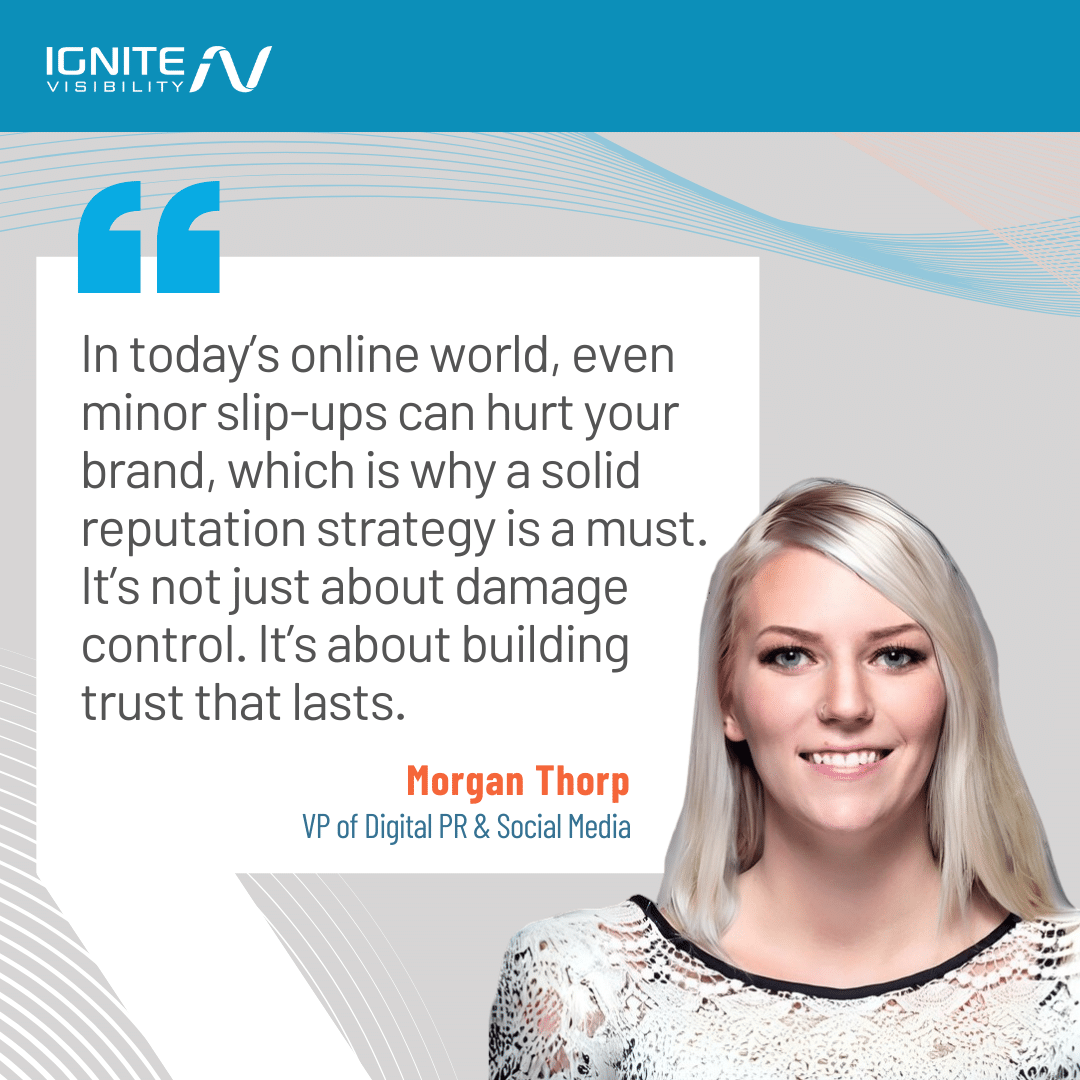
What is Online Reputation Management?
Online reputation management (ORM) is monitoring what people see when they search for your brand online. Examples of ORM include:
- Engaging with consumer feedback
- Creating dedicated review pages on your website
- Online promotion of your products or services
- Responding to online conversations about your brand
- Adopting a crisis management strategy in the event of negative publicity
The scope of an online reputation strategy covers a range of solutions, including review management, content generation to develop one or more responses, and crisis response to properly address negative press.
When developing your online reputation strategy, it helps to diagram it. Generally, the reputation management of a company will involve the following basic components:
- Monitoring: Reputation management monitoring will look for any negative brand mentions and discussions.
Response: Issuing a response to the negative perspective, which could entail providing a more comprehensive explanation of a potential misunderstanding that led to the negative press or discussions. - Amplification: Amplify your response as much as possible to maximize exposure, making this a critical element of your reputation management strategy. Post your response on your website, social media, and other potential channels to get the message out there.
- Measurement: Look at brand mentions and gauge the general attitude toward your brand as you attempt to eliminate negative opinions.
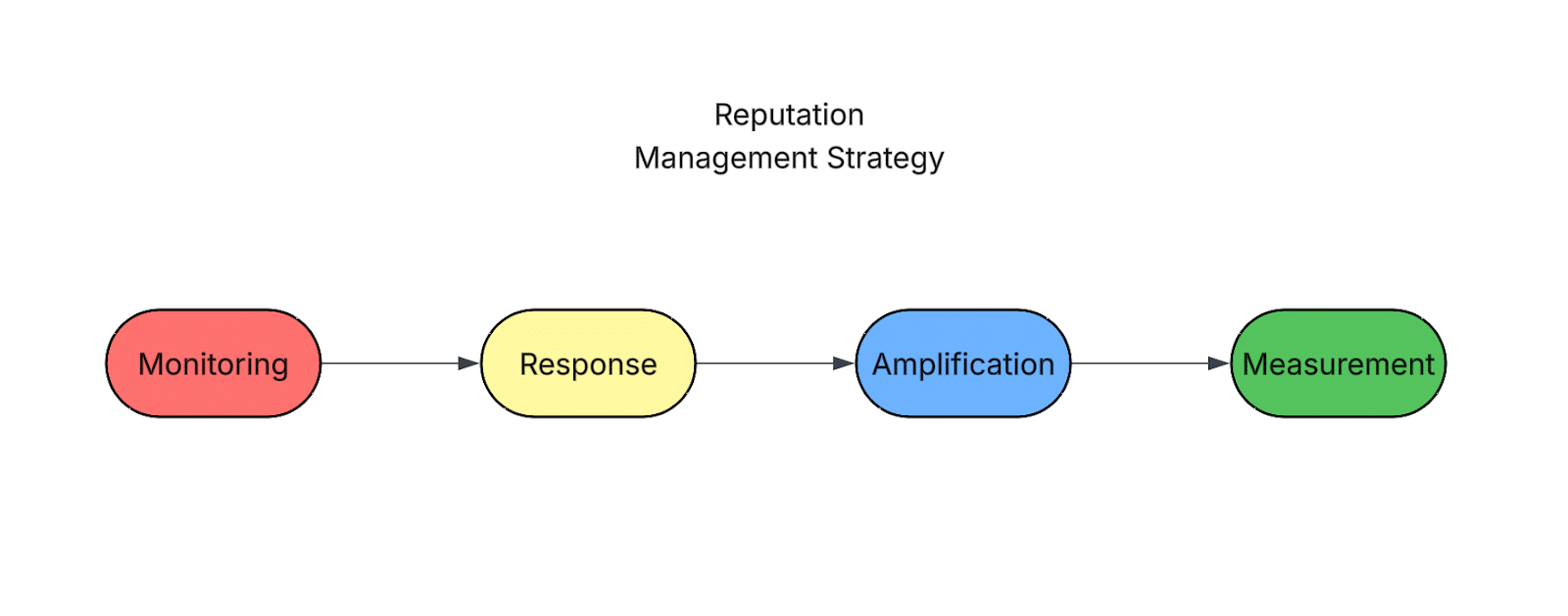
Why Is Online Reputation Management Important?
An effective online reputation attracts new customers, increases customer loyalty, and motivates people to recommend your products.
On the other hand, a bad online reputation is a serious liability. Your brand’s credibility and trustworthiness can suffer catastrophic long-term damage due to negative reviews, customer complaints, and inaccurate information.
That’s why ORM is also a form of customer service.
When you reply to comments and offer support to those who need it, you show customers you care. This can increase customer satisfaction, which is good for business.
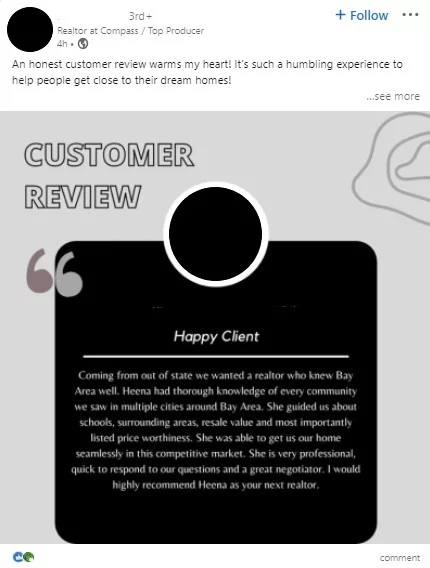
How ORM Fits Into Your Sales Funnel
A sales funnel isn’t complete without ORM.
ORM engages potential customers at the top of the funnel. By creating content that speaks positively about your product or service, you can attract more people to your website.
In the middle of the funnel, ORM nurtures leads. Engaging potential customers proactively, responding to customer inquiries, and providing helpful customer service can help you convert more leads into customers.
And at the bottom of the funnel, ORM retains customers. Responding to customer feedback and monitoring customer reviews will help you build customer loyalty.
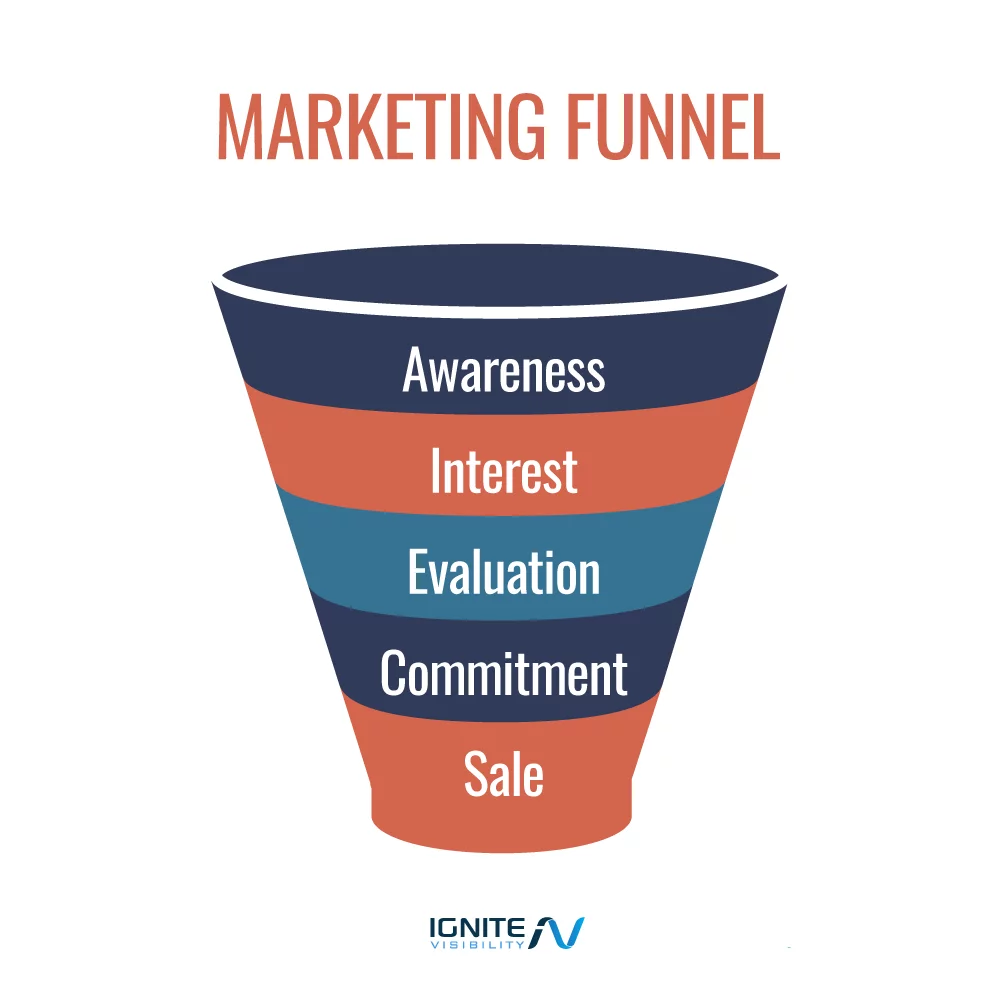
Proven ORM Strategies to Maximize Your Online Presence
Here are a few of the most effective online reputation management strategies:
1. Perform a Brand Audit
Before you can start managing your online reputation, you need to understand your current online presence. Doing a brand audit allows you to identify any weaknesses and prioritize which areas need the most attention.
For example:
- Check your social media profiles to ensure the information is accurate and up-to-date.
- Look at online reviews and consumer feedback to see if there are any areas of improvement.
- Analyze your website, SEO, and online presence to identify any areas of opportunity.
To illustrate, imagine a company that’s struggling with lukewarm customer reviews.
After performing a brand audit, the company discovers that many of the negative reviews are related to an outdated website. As a result, they can quickly prioritize website updates to address the feedback and improve their online presence.
In another case, a brand might discover that people on social media are talking negatively about the company because information on profiles is outdated or physical locations are difficult to find.
This audit would ultimately form the foundation for a reputation management plan that could protect your company in the long term.
2. Monitor Brand Mentions
Monitoring brand mentions lets you identify complaints before they become bad reviews.
Track your brand mentions across the web with listening tools like Google Alerts. This enables you to find negative reviews, contact the customer, solve the issue, and save both the client and your reputation.
Tracking brand mentions is useful for other interactions, too. Imagine a client recommends your product on Twitter—you can retweet their praise and thank them for the kind words.
When conducting reputation management monitoring, look at all relevant channels where you might find your audience, including:
- Social media platforms like Facebook, X, TikTok, and Instagram
- Review platforms like Google and Yelp
- Industry forums that discuss various brands and industry topics
3. Respond to Negative Reviews
No matter how well you manage your online presence, you’ll inevitably receive some negative reviews. Responding quickly and professionally is essential when this happens.
Apologize for the customer’s experience and offer a solution. Try to see the situation from the customer’s point of view and do what you can to make it right.
You’ll show potential customers that you care about customer feedback by replying quickly and respectfully.
As you discover how to improve online reputation management, you can determine which kinds of responses appeal most to negative reviewers or other customers. You may also find a common thread among negative reviews that might give you clear guidance on how to improve your customer experience.
4. Invest More In SEO
Search engine optimization (SEO) means optimizing pages for search engines. This enables you to get more organic traffic and organic sales without spending any money on ads.
SEO plays a crucial role in ORM.
If you have a strong SEO strategy, your website will appear at the top of search results for terms related to your industry. Since Google can be highly competitive, this gives customers a more favorable impression of your brand.
Keep in mind that a lot of branded SEO-optimized content could also show up higher than content speaking negatively about a brand. For example, a professional response in the form of a keyword-optimized web page might appear first before web pages discussing the same controversy.
A good online reputation manager could provide reliable SEO services in addition to reputation management services, along with other marketing solutions in a holistic strategy.
5. Leverage Public Relations
Public relations (PR) is managing the public’s perception of your brand. A good PR strategy can help you establish credibility, gain visibility, and build customer relationships.
For example, if you launch a new product, you can leverage PR to get media coverage and create a buzz around your brand. You can also use PR to respond to customer complaints and reassure customers that you’re working hard to address their issues.
PR professionals will know how to use the right language and approach to sway public opinion, whereas brands with a lack of experience dealing with the press may unintentionally say or do the wrong thing, potentially only worsening their reputation.
6. Encourage Customer Reviews
Selling products online without reviews is like having a bakery with no bread out.
77% of customers ‘always’ or ‘regularly’ read reviews when browsing for local businesses.
Encourage customers to leave reviews on social media, Google, and review sites. You can use email campaigns, ask customers while they’re in your store, or post your review links in a prominent place on your website.
This leads to more positive reviews, which leads to more revenue.
Remember, even if you receive some negative reviews that appear intimidating, a big part of review management is responding to those reviews thoughtfully, addressing concerns and working to resolve any issues in a way that benefits both parties.
People who see that you acknowledge customer complaints and provide favorable responses will be more likely to trust you over competitors who simply ignore any negative reviews.
7. Promote Wins
There’s nothing wrong with tooting your own horn every once in a while. Publicizing your successes, such as awards and recognition, can help establish credibility and trustworthiness.
Share your good news on social media, send a press release, or write a blog post about it. This can help you create a positive perception of your brand and attract more customers.
Pages on a website spreading the good news could also appear high in search engine rankings, potentially outranking less favorable content attempting to attack a brand. Also, the more positivity around your brand, the less relatively minor negative opinions will impact people’s view of you.
Building Your Reputation Management Strategy
When putting together an online reputation strategy, there are some critical aspects to consider.
Here, we’ll get into some online reputation management tips that can bolster your strategy: management service, you could benefit from an entire host of digital marketing solutions, from search engine optimization and conversion rate optimization to social media and email marketing.
With our help, you’ll be able to:
- Monitor for brand mentions and discussions to identify negative opinion
- Develop a strong response to this opinion and amplify it on all relevant channels
- Measure the success of your efforts
- Integrate reputation management into a holistic digital marketing strategy
Like this idea? Request a free proposal from us today, and we’ll connect you with our experts.
Set SMART Goals
The reputation management of a company largely depends on the goals the company sets.
Like other goals, reputation management goals should appeal to the SMART acronym, meaning they’ll be Specific, Measurable, Achievable, Relevant, and Timely.
For instance, you might set a goal to increase 4- and 5-star reviews by 20% within six months. If you have a large customer base and repeat customers, this may be achievable as you encourage people to leave reviews, potentially in exchange for some kind of incentive.
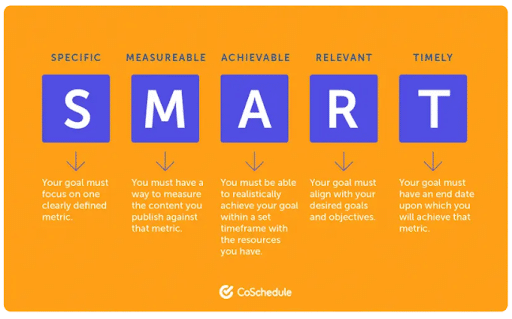
Prioritize Channels
Another online reputation management best practice is to prioritize the channels you use.
Pick the top three to five platforms you and your audience use based on target audience demographics and your industry. These platforms might include the most popular social media platforms, or they could incorporate more obscure forums and sites specific to your niche.
Develop a Crisis Plan
Based on your organization’s specific needs, you could also put together a mini-playbook to serve as your company’s reputation management guide. It could detail how to respond to negative reviews or more extensive negative incidents while aligning with your brand values and messaging.
Best Online Reputation Management Tools
Here are some of the best online reputation management tools:
1. Rallio
Ignite Visibility acquired Rallio, a social media management platform that helps you monitor and manage your online presence.
You can monitor social media, review sites, and forums with Rallio. This lets you respond quickly and effectively to customer feedback.

2. HootSuite
HootSuite is a social media management platform that helps you monitor and manage your online presence.
You can monitor social media, review sites, and forums with HootSuite. This lets you respond quickly and effectively to customer feedback.

3. BuzzSumo
BuzzSumo tracks brand mentions, tracks influencers, and analyzes competitors. It’s great for identifying potential customers, monitoring reviews, and improving your online presence.
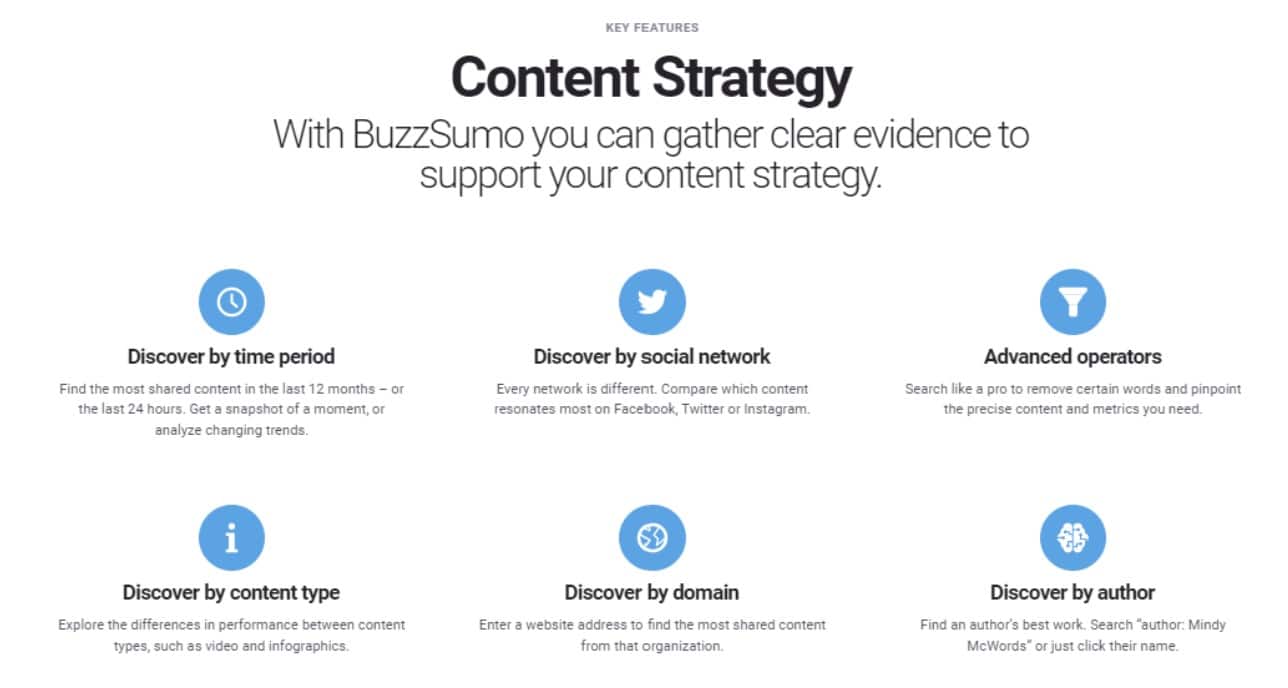
4. Google Alerts
Google Alerts is a free monitoring tool that alerts you when people mention you online. You can use it to track customer feedback, find new customers, and monitor buzz about your brand.

5. GatherUp
GatherUp helps you collect customer feedback and display it on your website and social media profiles. It also helps you monitor online reviews, create surveys, and measure Net Promoter Scores, providing holistic insights into customer sentiment.
Brand Examples of Online Reputation Management
Here are real-life examples of brands going the extra mile for their ORM:
1. Airbnb
Airbnb’s online reputation is one of the best. They constantly monitor customer feedback to identify areas of improvement and respond to negative reviews quickly and professionally.
Additionally, they have a “Trust & Safety” page on their website outlining their commitment to promoting a safe and secure experience. This builds trust and reassures customers that their data is safe.
2. Amazon
Amazon is the king of online reputation management. Their ecosystem rewards customers for leaving reviews and takes steps to protect customers from malicious reviews.
They also use algorithms to detect fraudulent reviews and prioritize helpful reviews. This helps them maintain the trust and credibility of customers by displaying accurate and trustworthy feedback.
3. Starbucks
Starbucks monitors customer feedback on review sites, social media, and its own website. When customers aren’t happy, they make it a priority to resolve the issue quickly and efficiently.
They also use customer feedback to get ahead of any potential problems. When a customer gives feedback about a product, Starbucks takes the time to analyze why and develop better solutions.
FAQs and Troubleshooting
1. How can I quickly improve my brand reputation?
It’s important to know how to improve online reputation management quickly in the event of a PR disaster. You can do so by looking deeper into your brand mentions through social media listening and other forms of monitoring, developing a response in accordance with a detailed playbook, and amplifying that response while measuring the results of your efforts.
2. How do you handle fake or spam reviews?
If possible, report any obviously fake or spammy reviews to the respective platform with an explanation, which could cause the platform to delete them. However, when it isn’t as obvious and the platform won’t honor your request, you could respond to the review with plenty of details and evidence to help show how the review is fake or dishonest.
3. Can I integrate ORM into my broader marketing strategy?
Yes, you can easily integrate online reputation management into your overarching marketing strategy, tying it into SEO, PPC, social media, email marketing, and other aspects of your marketing suite, often with the help of a full-service online reputation manager.
Get Help With Reputation Management from Ignite Visibility
Taking cues from this reputation management guide, you can protect your company’s namesake online and avoid the potentially devastating hit of negativity.
If you want to learn more about how to improve online reputation management, it pays to work with an experienced online reputation manager. In addition to our reputation
